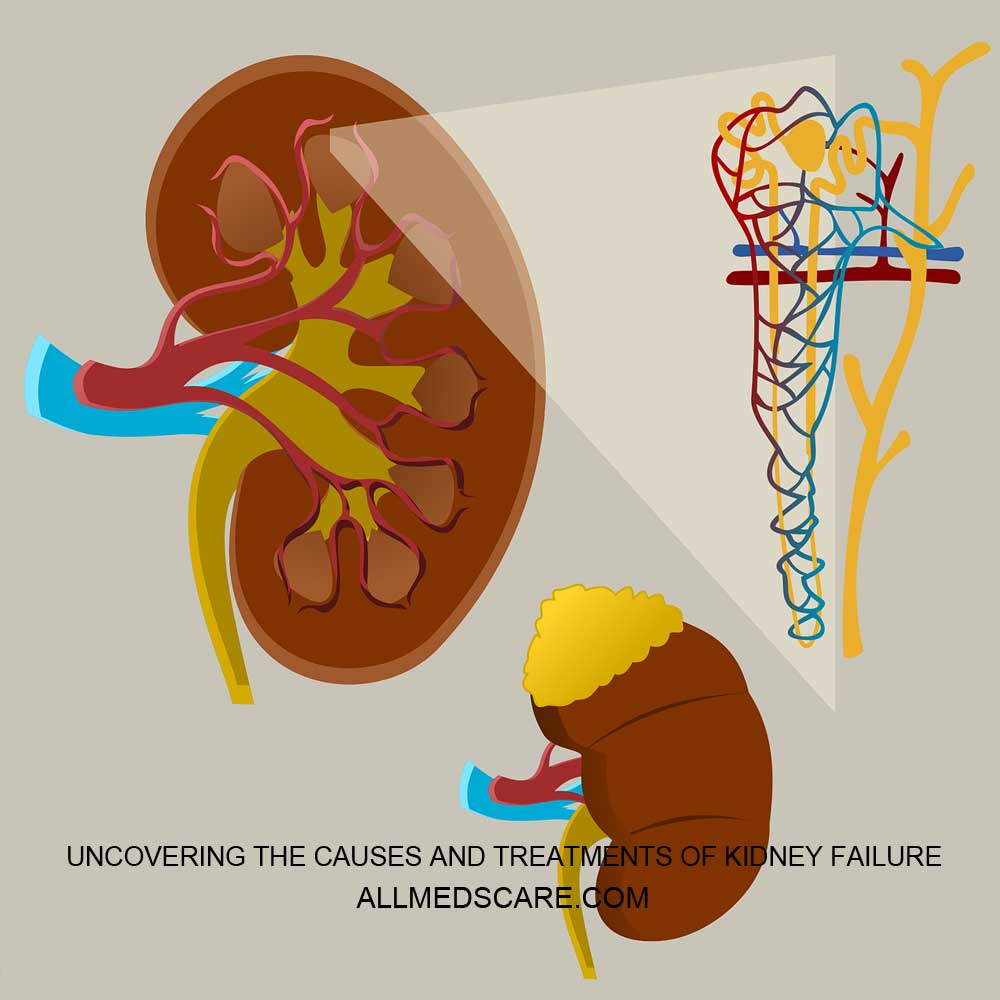
Uncovering the Causes and Treatments of Kidney Failure
When the kidneys cannot function properly, the result is renal/kidney failure. Kidney failure, also known as end-stage renal disease (ESRD), is a life-threatening condition. Since the kidneys are responsible for filtering toxins and other waste products from the blood, when they become damaged or fail to function at all, the body can cause serious problems. There are multiple causes of kidney failure such as chronic infections, diabetes, and high blood pressure. In this situation, the organ may permanently damage. Other common causes include progressive glomerulonephritis (inflammation) and genetic diseases such as polycystic kidney disease (PKD). Sudden trauma or injury can also cause acute kidney failure.

Symptoms of Kidney Failure
Fatigue, loss of appetite, nausea, vomiting, swelling of the face, hands, or feet, and difficulty breathing due to fluid accumulation in the lungs (pneumonia) are common symptoms of kidney failure. Other symptoms include difficulty urinating or discolored urine. Other signs may include confusion or changes in mental status as a result of toxins building up in the blood. If left untreated kidney failure can lead to serious complications such as anemia (low red blood cell count), high potassium levels, which can be life-threatening if not addressed quickly, and electrolyte imbalances which can cause seizures and cardiac arrest. In some cases, it could even lead to end-stage renal disease requiring dialysis or transplantation for survival. Any individual experiencing symptoms associated with kidney failure must consult their physician immediately for diagnosis and treatment options.
Risk Factors for Kidney Failure
One of the main risk factors for kidney failure is aging-related factors. As a person ages, their kidneys become less effective at filtering waste products and toxins from the blood, causing these substances to accumulate in the body and damage the organ. In addition, older people are more prone to certain chronic health problems, such as diabetes or high blood pressure, which, if left untreated, increase the risk of kidney failure.
Smoking is another significant factor in developing a person’s risk of kidney failure. The chemicals found in cigarettes damage large and small blood vessels throughout the body, including the kidneys, which can ultimately lead to poor filtration and other problems. Smoking causes many chronic health problems. It increases the possibility to develop end-stage renal disease (ESRD).
Finally, having any pre-existing chronic health issue increases one’s risk of getting ESRD due to potential long-term effects on various body systems, including those connected to renal function like hypertension or diabetes. Also, some diseases directly affect the kidney structure such as polycystic kidney disease (PKD) which leads to complete loss of nephron functionality, resulting in early diagnosis/progression of ESRD without proper treatment or lifestyle changes.
Diagnosing Kidney Failure
A doctor usually starts with a physical exam to identify kidney failure. During the examination, they will evaluate the patient’s overall health and search for any symptoms of kidney disease, such as swelling in the hands and face, high blood pressure, or poor skin tone due to anemia. Additionally, they may listen for unusual abdominal sounds that could point to issues with renal function.
After completing the physical examination, laboratory tests will be prescribed to further evaluate the possible causes and confirm the kidney failure diagnosis. This may include urine tests that measure levels of proteins, such as creatinine and albumin, which are normally filtered by healthy kidneys but can build up in severe damage. Blood tests can also provide valuable insight, including measuring electrolyte levels (elevations in potassium being particularly concerned) and evaluating red blood cell counts (anemia). Imaging studies such as ultrasounds or CT scans may also be used to help determine if there is any structural damage present within the kidneys themselves that could be contributing to decreased filtration rates.
The doctor will make treatment recommendations based on their findings after initial examination. In some cases, it may require lifestyle changes such as diet or taking medications prescribed by your doctor, while more severe cases may require dialysis or a transplant. You must follow up regularly with your healthcare team. Issues can be addressed much earlier before they become serious.
Treatment and Prevention of Kidney Failure
Medication is one of the main treatments for kidney failure because it can help control underlying diseases like diabetes or hypertension that may be causing harm. Additionally, medications can help reduce swelling and relieve symptoms associated with high levels of toxins in the blood. Commonly prescribed medications include diuretics (water pills) which help rid the body of excess fluids, ACE inhibitors to lower blood pressure, and dialysis drugs that aid in removing waste products from the bloodstream.
Diet and lifestyle changes are also crucial components for managing kidney failure over time. People should consume a healthy diet with lots of fruits and veggies and avoid processed foods, salt, alcohol, and other substances. These substances cause exacerbate kidney damage. Additionally, including regular physical exercise in your daily routine can benefit renal function by supporting blood glucose levels that stay within the normal range and preserving overall good cardiovascular health.
In some cases where drug management has failed or progressive kidney disease has occurred, transplantation may be necessary for survival if a suitable donor organ is available. Kidney transplant surgery involves exchanging a failing or damaged kidney with a healthy kidney. The healthy kidney is donated by a living relative or a deceased person.
The procedure is a complicated process. Careful examination both before and after transplantation is important. But success gives hope to those suffering from the life-changing condition and another chance at a life free of dialysis treatment and other complications directly related to end-stage renal disease (ESRD).






